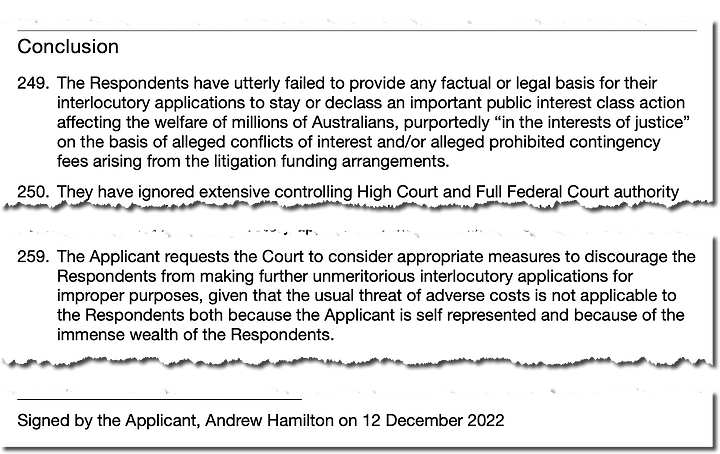
Conclusion
The Respondents have utterly failed to provide any factual or legal
basis for their interlocutory applications to stay or declass an
important public interest class action affecting the welfare of
millions of Australians, purportedly "in the interests
of justice" on the basis of alleged conflicts of interest and/or
alleged prohibited contingency fees arising from the litigation
funding arrangements.They have ignored extensive controlling High Court and Full Federal
Court authority which creates insurmountable obstacles to their
applications and instead cited a dubious selection of superseded,
clearly inapplicable and plainly wrong cases, mostly first
instance, two without a contradictor and where binding authority
was not brought to the attention of the Court and in State rather
than Federal Courts.They have completely failed to make out any real conflict of
interest between the Applicant and group members (or any other
conflict of interest).They have wrongly impugned the Applicant's professional experience
and conduct.They have consistently cited cases which rely on the ancient
concepts of maintenance and champerty (especially in relation to
alleged contingency fees) without understanding these concepts,
their legal history and why they can never have any application to
these proceedings.They have failed to cite any authority that conflict of interest or
contingency fees are a basis for staying or declassing proceedings
regularly brought, let alone proceedings where the Court has
already taken active steps to assert jurisdiction on the basis of a
prima facie case and public interest.They have ignored the very substantial public interest in these
proceedings and the highly relevant binding authority of Epic,
which demonstrates that such public interest provides very strong
reasons for not staying proceedings, even when a strong basis for
staying does actually exist.They have failed to examine, as required by binding authority,
whether their concerns (if they had any validity at all) could be
addressed by other tools available to the Court.They have engaged in less than ideal professional conduct in an
attempt to advance entirely unmeritorious interlocutory
applications for the improper purposes of preventing a substantive
hearing of the Applicant's claims enforcing Part IV of the CCA and
putting costs pressure on a self-represented applicant by inserting
this interlocutory application prior to the hearing of the
Applicant's interlocutory application for a No Adverse Costs Order,
made at the earliest stage of proceedings (almost 2.5 years ago)
and part heard.The Respondents' interlocutory applications must be dismissed.
The Applicant requests the Court to consider appropriate measures
to discourage the Respondents from making further unmeritorious
interlocutory applications for improper purposes, given that the
usual threat of adverse costs is not applicable to the Respondents
both because the Applicant is self represented and because of the
immense wealth of the Respondents.
__________________________________
Signed by the Applicant, Andrew Hamilton on 12 December 2022
Please vote for my Hive witness. (KeyChain or HiveSigner)





